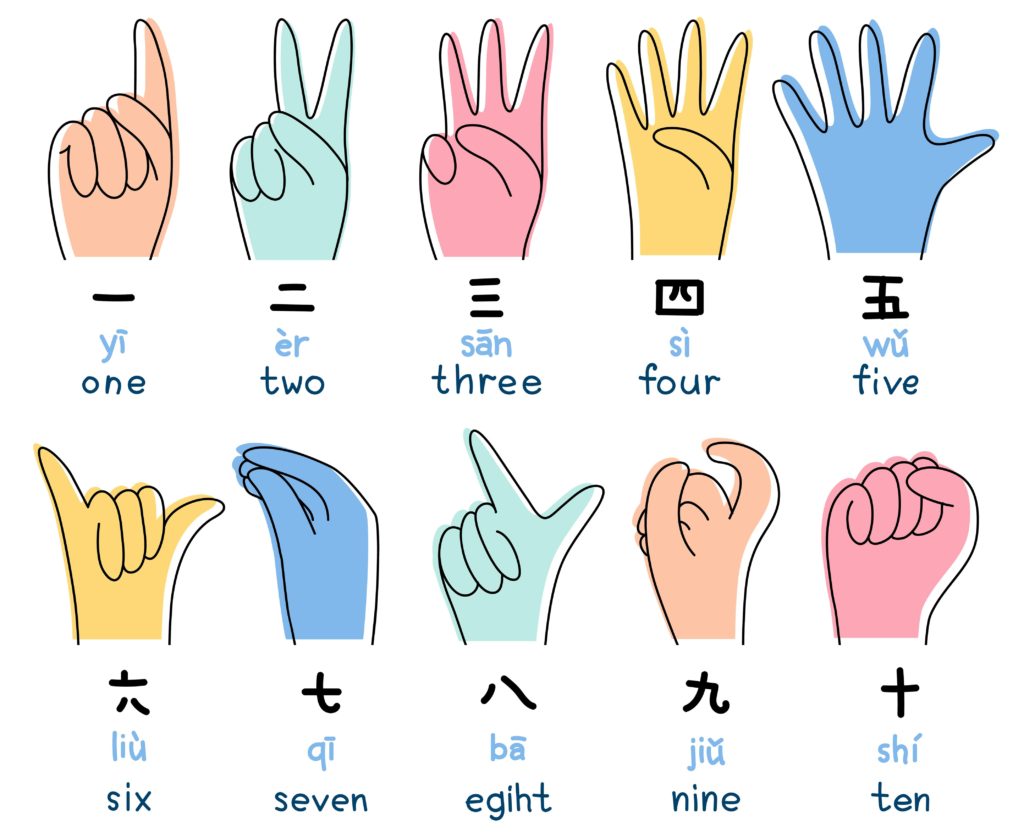
Chinese Idioms with Numbers to Level-Up Your Mandarin
Every language has its idioms – unique word combinations that, taken at face value, mean something different than what they’re actually referencing. And with Mandarin Chinese, one of the world’s great historical languages, with roots going back thousands of years, the list of Chinese idioms has grown like few other spoken tongues.
The impressive Mandarin linguistic legacy – fueled by poets, philosophers, statesmen, political leaders, emperors, explorers, and more – has given the world what’s known as Chinese chengyu. These common Chinese idioms are natural for Mandarin speakers, but for those learning Mandarin, they can be challenging to learn!

Chinese Chengyu: China’s Unique Take on Idioms
Idioms are expressions that don’t have a direct literal translation. They’re like riddles—to understand them, you need to understand the context as well as the words. And since Mandarin Chinese encompasses so many regional cultures, each with its own unique history, Chinese chengyu comprises one of the most extensive collections of idioms you’ll find in any language. They’re one of the most fun parts of learning a language because they give you a window into the culture as well. Chinese idioms, in particular, are an underrated way for new language learners to discover interesting knowledge about China, its people, and its history. If you really want to learn Mandarin, get your list of Chinese idioms ready!
What are Chinese Idioms?
Chinese is a complex language and is filled to the brim with idiomatic expressions.
Chinese idioms (aka. 成語, chéng yǔ) are typically four characters that together express a figurative meaning. They have been woven together over thousands of years from ancient myths, tales, philosophical texts, and poetry. Many represent longer stories that are condensed into succinct characters to depict a part of the narrative.
Another common trait with Chinese idioms is they usually don’t follow the typical subject-object-verb structure of most Mandarin sentences, making Chinese chengyu even more of an enigma than they already are!
You’ll hear them everywhere, from regular conversation to Chinese historical, palace dramas on TV. All Mandarin speakers know some chéng yǔ, but using them in daily conversations can help you stand out and appear eloquent and cultured!
Chinese Idioms: Essential Chengyu and Their Meanings
We’ve compiled a baker’s dozen right here, with some of the most famous Chinese idioms.
While knowing about idioms is not required to master Mandarin, learning about them provides fascinating context into the rich linguistic heritage of the Mandarin language. And as you acquire them, you’ll find that some of the most common Chinese idioms have a decidedly uncommon origin story! Check out this Chinese chengyu list:
1. 一落千丈 (yī luò qiān zhàng)
Literal translation: One fall, a thousand feet.
Figuratively, this saying means that one mistake or fault can result in disastrous consequences. For instance, “he made a wrong move and his performance has yī luò qiān zhàng since then.”
2. 二话不说 (èr huà bù shuō)
Literal translation: Second word, not said.
This saying means to act quickly without saying another word. Basically, without delay or without further ado.
3. 三心二意 (sān xīn èr yì)
Literal translation: Three minds, two intents.
This one means being half-hearted, being of two minds, or being hesitant. It is often used to describe someone who has difficulties focusing on something or who is indecisive.
4. 四面八方 (sì miàn bā fāng)
Literal translation: Four sides, eight directions.
This one is similar to the English idiom “four corners of the Earth,” it means from all around, from far and near, or in all directions. For instance, “the enemy surrounded them from sì miàn bā fāng.”
5. 五颜六色 (wǔ yán liù sè)
Literal translation: Five colors, six colors.
This saying is used to describe something as very colorful, but it can also refer to something that has a variety of devices or patterns. For instance, “rainbows are wǔ yán liù sè.”
6. 六根清净 (liù gēn qīng jìng)
Literal translation: Six roots, peaceful.
This idiom makes a reference to the six roots of sensations in Buddhism—the eyes, ears, nose, tongue, body, and mind. It suggests that these are peaceful, pure, or clean. In other words, it describes a sense or state of peacefulness that is free of desires.
7. 七嘴八舌 (qī zuǐ bā shé)
Literal translation: Seven mouths, eight tongues.
This saying is somewhat similar to the English idiom “at sixes and sevens,” which means confusion or disarray. The Chinese version is used to refer to a situation that is noisy, in which many people are talking at once, or that is full of lively discussion.
8. 八面玲珑 (bā miàn líng lóng)
Literal translation: Eight sides, exquisite/delicate.
This one is a bit more complex because its meaning has shifted over time. Originally, it was used to describe a spacious and well-lit area. Now, it is more often used to describe someone who is diplomatic, smooth, and adept in establishing social relations.
9. 九牛一毛 (jiǔ niú yī máo)
Literal translation: Nine cows, one strand of cow hair.
This idiom is used to refer to something very small that you wouldn’t notice. It’s very visual: The idea is that you would hardly notice a single strand of cow hair among nine cows.
10. 十全十美 (shí quán shí měi)
Literal translation: Ten, entirety, ten, beauty.
This idiom is used to describe something that is flawless and perfect. You can also use it to describe a person—it’s a compliment!
11. 百年好合 (bǎi nián hǎo hé)
Literal translation: Hundred years, good union.
This idiom is often used to congratulate couples at weddings. It’s a wish that they have a harmonious union—not just for a hundred years, but forever!
12. 千真万确 (qiān zhēn wàn què)
Literal translation: Thousand real, ten thousand true.
This idiom is used to emphasize that something is really, surely, absolutely true. Use it to underscore how confident you are with what you are presenting!
13. 万无一失 (wàn wú yī shī)
Literal translation: Ten thousand, not one mistake.
This idiom is used in a similar way to how we might say something is “foolproof” in English. You use it to express that you are very confident that there is no way something will go wrong or fail. The idea is that even if something would happen ten thousand times, there wouldn’t be a single failure or mistake.
Bonus Chinese Chengyu
Aside from the idioms presented in the Chinese Chengyu list above, there are plenty of other sayings popular in everyday Mandarin speech. You’ll recognize some of these, as they’re frequently used in English:
- 熟能生巧 (Shúnéngshēngqiǎo)
Literal translation: Practice makes perfect.
Like in English, this means the more you practice, the better you become at something.
- 家喻户晓 (Jiāyùhùxiǎo)
Literal translation: Known in every household.
This is somewhat similar to the English sentiment behind “a household name;” in other words, something well-known.
- 一日千秋 (Yī rì qiānqiū)
Literal translation: One day feels like a thousand autumns.
This is used to express intense longing or impatience. It communicates the sensation of time passing more slowly when you yearn for something deeply; one day can feel as long as a thousand years.
- 画龙点睛 (Huà lóng diǎnjīng)
Literal translation: Add eyes when painting a dragon.
This saying emphasizes the importance of adding the proper finishing touch in order to make something transform from good to extraordinary.
- 易如反掌 (Yì rú fǎn zhǎng)
Literal translation: Easier than turning over your hand.
This is used to describe something effortless or simple. It is similar to the English sayings, “a piece of cake” or “as easy as ABC.”
- 杯水车薪 (bēi shuǐ chē xīn)
Literal translation: A cup of water (to put out) a cartload of firewood.
This means, like using a cup of water to put out a whole fire, the solution to the problem is inadequate or futile.
- 掩耳盗铃 (yǎn ěr dào líng)
Literal translation: Cover one’s ears while stealing a bell.
This means you’re deceiving yourself thinking others won’t hear something if you can’t hear it. In other words, it describes someone who is acting foolishly or irrationally.
- 一目十行 (yī mù shí háng)
Literal translation: One glance, ten lines.
This refers to the ability to read extremely fast, taking in multiple lines at a time.
- 三人行,必有我师 (sān rén xíng, bì yǒu wǒ shī)
Literal translation: From the Analects of Confucius, this translates to when three people walk together, there must be one who can be my teacher.
This idiom expresses humility and reminds us that there is something to learn from everyone.
Incorporating Chengyu to Enrich Your Mandarin Skills
Idioms are a fantastic way to learn any language, but they’re an especially good way to learn Mandarin Chinese. They can help you see how closely expressions are tied to Chinese culture and history.
Now it’s your turn! Try to start dropping some of the above Chinese idioms into everyday conversation to practice speaking in Mandarin. Your friends will be impressed!
Need a headstart? Pimsleur can give you the tools you need to master Chinese. Begin your Mandarin Chinese language journey today!